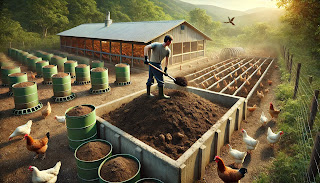Poultry manure management is essential for maintaining flock health, preventing disease outbreaks, and promoting sustainable farming practices. Poor handling of manure can lead to ammonia buildup, fly infestations, and the spread of harmful pathogens. Implementing best practices ensures a cleaner environment and maximizes the benefits of poultry waste as a valuable fertilizer.
Why Poultry Manure Management is Essential
✅ Prevents Disease & Parasite Infestation
- Accumulated manure creates a breeding ground for bacteria like Salmonella, E. coli, and Clostridium, which can lead to serious poultry diseases.
- Moist bedding and droppings attract flies, lice, and mites, increasing stress and health risks for chickens.
✅ Controls Ammonia Levels & Improves Air Quality
- Decomposing manure releases ammonia, which can cause respiratory problems, eye irritation, and reduced egg production.
- Proper ventilation and frequent cleaning help maintain healthier air quality in the poultry house.
✅ Enhances Poultry Hygiene & Productivity
- A clean and dry coop minimizes footpad dermatitis, hock burns, and other health issues related to dirty litter.
- Healthier birds mean better weight gain, stronger immune systems, and higher egg-laying efficiency.
✅ Converts Waste into a Valuable Fertilizer
- Poultry manure is rich in nitrogen, phosphorus, and potassium (NPK), making it one of the best organic fertilizers for crops.
- Proper composting and drying improve its effectiveness while eliminating harmful pathogens.
Best Practices for Poultry Manure Management
1. Frequent Cleaning & Waste Removal
- Daily or Weekly Manure Collection: Regular removal prevents excessive buildup, reduces odors, and minimizes the risk of disease.
- Dry Litter Management: Keep bedding materials such as wood shavings or rice husks dry to reduce bacterial growth.
2. Manure Drying & Proper Storage
- Reduce Moisture Content: Wet manure leads to high ammonia emissions and fly problems. Use absorbent bedding and ensure proper ventilation.
- Store Away from Poultry Houses: Manure should be stored in designated bins or pits to prevent contamination and odor issues.
3. Composting for Safe & Sustainable Use
- Composting kills harmful bacteria, stabilizes nutrients, and eliminates odors.
- Ensure the compost pile reaches 130-150°F (55-65°C) to kill pathogens and weed seeds.
- Turn the compost every 7-10 days to speed up decomposition and aerate the pile.
4. Using Poultry Manure as Fertilizer
- Aged manure is best for direct application to crops, as fresh manure can burn plants due to high nitrogen levels.
- Mix composted poultry manure into garden soil, pasture lands, or organic farming systems for maximum benefits.
- Avoid spreading raw manure on crops that will be harvested within 90 days to prevent bacterial contamination.
5. Controlling Odor & Environmental Impact
- Biochar & Lime: Adding biochar or agricultural lime helps neutralize odors and balance manure pH.
- Manure Treatment Lagoons: For large poultry farms, manure lagoons help reduce pollution and recycle nutrients efficiently.
- Tree Buffers & Windbreaks: Planting trees around manure storage areas helps absorb odors and improve air quality.
Conclusion
Proper poultry manure management is crucial for maintaining a clean, healthy, and sustainable farming environment. By implementing effective cleaning routines, drying methods, and composting techniques, farmers can prevent diseases, control ammonia levels, and create high-quality organic fertilizers. Whether raising chickens for eggs or meat, responsible manure management benefits both poultry health and agricultural productivity.
Stay tuned for more expert poultry farming tips at PoultryHatch! 🐔🌱

